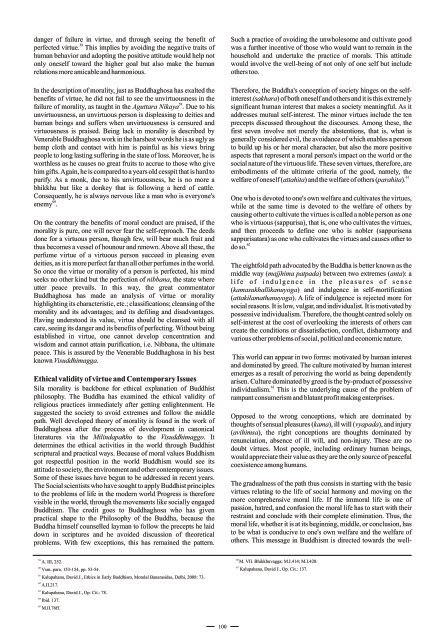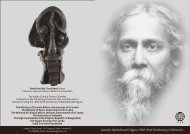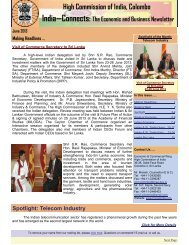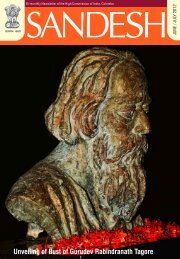Papers presented at the International Buddhist Conference, March ...
Papers presented at the International Buddhist Conference, March ...
Papers presented at the International Buddhist Conference, March ...
Create successful ePaper yourself
Turn your PDF publications into a flip-book with our unique Google optimized e-Paper software.
danger of failure in virtue, and through seeing <strong>the</strong> benefit of<br />
58<br />
perfected virtue. This implies by avoiding <strong>the</strong> neg<strong>at</strong>ive traits of<br />
human behavior and adopting <strong>the</strong> positive <strong>at</strong>titude would help not<br />
only oneself toward <strong>the</strong> higher goal but also make <strong>the</strong> human<br />
rel<strong>at</strong>ions more amicable and harmonious.<br />
In <strong>the</strong> description of morality, just as Buddhaghosa has exalted <strong>the</strong><br />
benefits of virtue, he did not fail to see <strong>the</strong> unvirtuousness in <strong>the</strong><br />
59<br />
failure of morality, as taught in <strong>the</strong> Aguttara Nikaya . Due to his<br />
unvirtuousness, an unvirtuous person is displeasing to deities and<br />
human beings and suffers when unvirtuousness is censured and<br />
virtuousness is praised. Being lack in morality is described by<br />
Venerable Buddhaghosa work in <strong>the</strong> harshest words he is as ugly as<br />
hemp cloth and contact with him is painful as his views bring<br />
people to long lasting suffering in <strong>the</strong> st<strong>at</strong>e of loss. Moreover, he is<br />
worthless as he causes no gre<strong>at</strong> fruits to accrue to those who give<br />
him gifts. Again, he is compared to a years old cesspit th<strong>at</strong> is hard to<br />
purify. As a monk, due to his unvirtuousness, he is no more a<br />
bhikkhu but like a donkey th<strong>at</strong> is following a herd of c<strong>at</strong>tle.<br />
Consequently, he is always nervous like a man who is everyone's<br />
60<br />
enemy .<br />
On <strong>the</strong> contrary <strong>the</strong> benefits of moral conduct are praised, if <strong>the</strong><br />
morality is pure, one will never fear <strong>the</strong> self-reproach. The deeds<br />
done for a virtuous person, though few, will bear much fruit and<br />
thus becomes a vessel of hounour and renown. Above all <strong>the</strong>se, <strong>the</strong><br />
perfume virtue of a virtuous person succeed in pleasing even<br />
deities, as it is more perfect far than all o<strong>the</strong>r perfumes in <strong>the</strong> world.<br />
So once <strong>the</strong> virtue or morality of a person is perfected, his mind<br />
seeks no o<strong>the</strong>r kind but <strong>the</strong> perfection of nibbana, <strong>the</strong> st<strong>at</strong>e where<br />
utter peace prevails. In this way, <strong>the</strong> gre<strong>at</strong> comment<strong>at</strong>or<br />
Buddhaghosa has made an analysis of virtue or morality<br />
highlighting its characteristic, etc.; classific<strong>at</strong>ions; cleansing of <strong>the</strong><br />
morality and its advantages; and its defiling and disadvantages.<br />
Having understood its value, virtue should be cleansed with all<br />
care, seeing its danger and its benefits of perfecting. Without being<br />
established in virtue, one cannot develop concentr<strong>at</strong>ion and<br />
wisdom and cannot <strong>at</strong>tain purific<strong>at</strong>ion, i.e. Nibbana, <strong>the</strong> ultim<strong>at</strong>e<br />
peace. This is assured by <strong>the</strong> Venerable Buddhaghosa in his best<br />
known Visuddhimagga.<br />
Ethical validity of virtue and Contemporary Issues<br />
Sila morality is backbone for ethical explan<strong>at</strong>ion of <strong>Buddhist</strong><br />
philosophy. The Buddha has examined <strong>the</strong> ethical validity of<br />
religious practices immedi<strong>at</strong>ely after getting enlightenment. He<br />
suggested <strong>the</strong> society to avoid extremes and follow <strong>the</strong> middle<br />
p<strong>at</strong>h. Well developed <strong>the</strong>ory of morality is found in <strong>the</strong> work of<br />
Buddhaghosa after <strong>the</strong> process of development in canonical<br />
liter<strong>at</strong>ures via <strong>the</strong> Milindapañho to <strong>the</strong> Visuddhimaggo. It<br />
determines <strong>the</strong> ethical activities in <strong>the</strong> world through <strong>Buddhist</strong><br />
scriptural and practical ways. Because of moral values Buddhism<br />
got respectful position in <strong>the</strong> world Buddhism would see its<br />
<strong>at</strong>titude to society, <strong>the</strong> environment and o<strong>the</strong>r contemporary issues.<br />
Some of <strong>the</strong>se issues have begun to be addressed in recent years.<br />
The Social scientists who have sought to apply <strong>Buddhist</strong> principles<br />
to <strong>the</strong> problems of life in <strong>the</strong> modern world Progress is <strong>the</strong>refore<br />
visible in <strong>the</strong> world, through <strong>the</strong> movements like socially engaged<br />
Buddhism. The credit goes to Buddhaghosa who has given<br />
practical shape to <strong>the</strong> Philosophy of <strong>the</strong> Buddha, because <strong>the</strong><br />
Buddha himself counselled layman to follow <strong>the</strong> precepts he laid<br />
down in scriptures and he avoided discussion of <strong>the</strong>oretical<br />
problems. With few exceptions, this has remained <strong>the</strong> p<strong>at</strong>tern.<br />
Such a practice of avoiding <strong>the</strong> unwholesome and cultiv<strong>at</strong>e good<br />
was a fur<strong>the</strong>r incentive of those who would want to remain in <strong>the</strong><br />
household and undertake <strong>the</strong> practice of morals. This <strong>at</strong>titude<br />
would involve <strong>the</strong> well-being of not only of one self but include<br />
o<strong>the</strong>rs too.<br />
Therefore, <strong>the</strong> Buddha's conception of society hinges on <strong>the</strong> selfinterest<br />
(sakhara) of both oneself and o<strong>the</strong>rs and it is this extremely<br />
significant human interest th<strong>at</strong> makes a society meaningful. As it<br />
addresses mutual self-interest. The minor virtues include <strong>the</strong> ten<br />
precepts discussed throughout <strong>the</strong> discourses. Among <strong>the</strong>se, <strong>the</strong><br />
first seven involve not merely <strong>the</strong> abstentions, th<strong>at</strong> is, wh<strong>at</strong> is<br />
generally considered evil, <strong>the</strong> avoidance of which enables a person<br />
to build up his or her moral character, but also <strong>the</strong> more positive<br />
aspects th<strong>at</strong> represent a moral person's impact on <strong>the</strong> world or <strong>the</strong><br />
social n<strong>at</strong>ure of <strong>the</strong> virtuous life. These seven virtues, <strong>the</strong>refore, are<br />
embodiments of <strong>the</strong> ultim<strong>at</strong>e criteria of <strong>the</strong> good, namely, <strong>the</strong><br />
61<br />
welfare of oneself (<strong>at</strong>tahita) and <strong>the</strong> welfare of o<strong>the</strong>rs (parahita).<br />
One who is devoted to one's own welfare and cultiv<strong>at</strong>es <strong>the</strong> virtues,<br />
while <strong>at</strong> <strong>the</strong> same time is devoted to <strong>the</strong> welfare of o<strong>the</strong>rs by<br />
causing o<strong>the</strong>r to cultiv<strong>at</strong>e <strong>the</strong> virtues is called a noble person as one<br />
who is virtuous (sappurisa), th<strong>at</strong> is, one who cultiv<strong>at</strong>es <strong>the</strong> virtues,<br />
and <strong>the</strong>n proceeds to define one who is nobler (sappurisena<br />
sappuris<strong>at</strong>ara) as one who cultiv<strong>at</strong>es <strong>the</strong> virtues and causes o<strong>the</strong>r to<br />
62<br />
do so.<br />
The eightfold p<strong>at</strong>h advoc<strong>at</strong>ed by <strong>the</strong> Buddha is better known as <strong>the</strong><br />
middle way (majjhima p<strong>at</strong>pada) between two extremes (anta): a<br />
l i f e o f i n d u l g e n c e i n t h e p l e a s u r e s o f s e n s e<br />
(kamasukhallikanuyoga) and indulgence in self-mortific<strong>at</strong>ion<br />
(<strong>at</strong>takilam<strong>at</strong>hanuyoga). A life of indulgence is rejected more for<br />
social reasons. It is low, vulgar, and individualist. It is motiv<strong>at</strong>ed by<br />
possessive individualism. Therefore, <strong>the</strong> thought centred solely on<br />
self-interest <strong>at</strong> <strong>the</strong> cost of overlooking <strong>the</strong> interests of o<strong>the</strong>rs can<br />
cre<strong>at</strong>e <strong>the</strong> conditions or diss<strong>at</strong>isfaction, conflict, disharmony and<br />
various o<strong>the</strong>r problems of social, political and economic n<strong>at</strong>ure.<br />
This world can appear in two forms: motiv<strong>at</strong>ed by human interest<br />
and domin<strong>at</strong>ed by greed. The culture motiv<strong>at</strong>ed by human interest<br />
emerges as a result of perceiving <strong>the</strong> world as being dependently<br />
arisen. Culture domin<strong>at</strong>ed by greed is <strong>the</strong> by-product of possessive<br />
63<br />
individualism. This is <strong>the</strong> underlying cause of <strong>the</strong> problem of<br />
rampant consumerism and bl<strong>at</strong>ant profit making enterprises.<br />
Opposed to <strong>the</strong> wrong conceptions, which are domin<strong>at</strong>ed by<br />
thoughts of sensual pleasures (kama), ill will (vyapada), and injury<br />
(avihimsa), <strong>the</strong> right conceptions are thoughts domin<strong>at</strong>ed by<br />
renunci<strong>at</strong>ion, absence of ill will, and non-injury. These are no<br />
doubt virtues. Most people, including ordinary human beings,<br />
would appreci<strong>at</strong>e <strong>the</strong>ir value as <strong>the</strong>y are <strong>the</strong> only source of peaceful<br />
coexistence among humans.<br />
The gradualness of <strong>the</strong> p<strong>at</strong>h thus consists in starting with <strong>the</strong> basic<br />
virtues rel<strong>at</strong>ing to <strong>the</strong> life of social harmony and moving on <strong>the</strong><br />
more comprehensive moral life. If <strong>the</strong> immoral life is one of<br />
passion, h<strong>at</strong>red, and confusion <strong>the</strong> moral life has to start with <strong>the</strong>ir<br />
restraint and conclude with <strong>the</strong>ir complete elimin<strong>at</strong>ion. Thus, <strong>the</strong><br />
moral life, whe<strong>the</strong>r it is <strong>at</strong> its beginning, middle, or conclusion, has<br />
to be wh<strong>at</strong> is conducive to one's own welfare and <strong>the</strong> welfare of<br />
o<strong>the</strong>rs. This message in Buddhism is directed towards <strong>the</strong> well-<br />
59<br />
A. III, 252.<br />
60<br />
Vsm. para. 153-154, pp. 53-54.<br />
66<br />
M. VII. Bhikkhuvagga; M.I.414; M.I.420.<br />
67<br />
Kalupahana, David J., Op. Cit.: 137.<br />
61<br />
Kalupahana, David J., Ethics in Early Buddhism, Motolal Banarasidas, Delhi, 2008: 73.<br />
62<br />
A.II.217.<br />
63<br />
Kalupahana, David J., Op. Cit.: 78.<br />
64<br />
Ibid. 137.<br />
65<br />
M.II.76ff.<br />
100

















